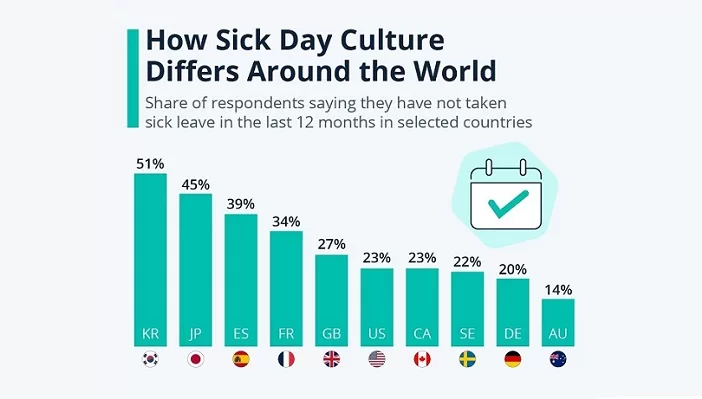Reports and Insights
Sick Leave Culture: Comparing Workplaces Around the Globe

A recent survey conducted by Statista’s Consumer Insights sheds light on the varying approaches to sick leave in different countries. The study focused on adults aged 18 to 64 and revealed intriguing insights into the sick leave practices across different nations.
South Korea and Japan: Reluctance to Take Sick Leave
In South Korea, a surprising trend emerged – over half of the respondents (approximately 55 percent) claimed they hadn’t taken a single sick day in the past 12 months. This peculiar phenomenon can be attributed to the country’s policy, where employers are not obligated to provide time off for non-work-related illnesses or injuries. This policy appears to influence the cultural approach to sick leave, encouraging employees to prioritize work over personal health.
Japan, another Asian nation, displayed a similar trend, with 45 percent of respondents reporting an absence-free year. While not as extreme as South Korea, this still represents a substantial portion of the workforce choosing not to take sick leave.
Australia: A Different Perspective
In stark contrast, Australian respondents showcased a remarkably different perspective on sick leave. Only 14 percent reported an absence-free year, indicating a more balanced approach to prioritizing health over work commitments. This suggests that in Australia, employees feel more comfortable taking the necessary time off when facing non-work-related health issues.
Europe and North America: Moderation in Sick Leave Practices
In Germany, Sweden, Canada, and the United States, the survey results displayed a moderate approach to sick leave. Approximately 20 to 23 percent of respondents reported an absence-free year, reflecting a more balanced attitude towards personal health and work commitments.
The survey conducted by Statista’s Consumer Insights highlights the diverse perspectives on sick leave across different countries. While South Korea and Japan demonstrate a reluctance to take sick days, Australia embraces a healthier balance between work and personal well-being. Meanwhile, European and North American nations exhibit a more measured approach. These findings shed light on the cultural nuances that influence how individuals prioritize their health in the workplace.
Source: Statista




















































